Iftar Time in Dubai 2023: Detailed Insights and Schedules
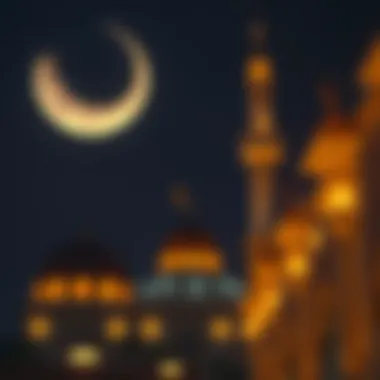
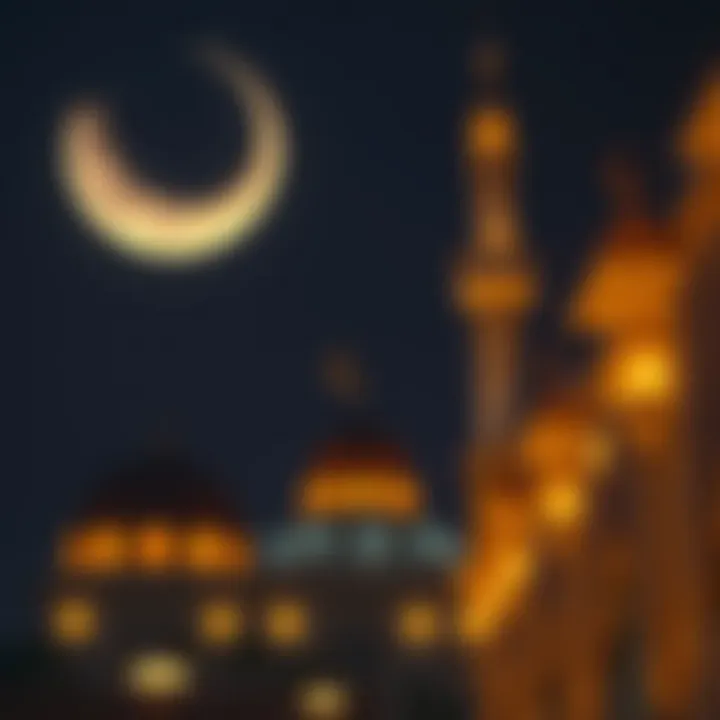
Intro
In the heart of the United Arab Emirates, Dubai stands as a vibrant metropolis that intertwines tradition with modernity. As the holy month of Ramadan approaches, the significance of iftar time comes to the forefront. For both expatriates and locals, this daily ritual is more than just breaking fast; it is a time steeped in cultural significance, community, and shared values.
In 2023, the iftar experience in Dubai is not only about the meal itself but also encompasses the myriad of customs that shape this sacred time. From bustling markets to serene mosques, Iftar serves as an opportunity for connection, reflection, and celebration. Here, we will explore the iftar times, delve into the local traditions surrounding it, and provide practical insights for those stepping into this profound experience for the first time.
As we parse through the details, we’ll uncover a blend of time-honored practices and contemporary adaptations that characterize iftar in this cosmopolitan city. Let’s embark on this journey to discover the layers of meaning attached to iftar and how it unfolds against the backdrop of Dubai's multifaceted culture.
Understanding Iftar
Iftar, the evening meal during Ramadan when Muslims break their fast, stands as a cornerstone of the Islamic faith. In Dubai, this ritual becomes not just a personal devotion but a collective gathering that highlights the essence of community, spirituality, and culture. As such, grasping the nuances of Iftar is vital for understanding how this month unfolds in a metropolis like Dubai.
Definition and Importance
The term "Iftar" stems from the Arabic word "fatar," which translates to "break the fast." It marks the moment when the sun sets and the call to prayer announces the end of the daily fast. For millions, the hour of Iftar is more than just satisfying hunger; it's a time imbued with spiritual significance, charity, and togetherness.
During Ramadan, fasting elevates one's consciousness, fosters empathy for the less fortunate, and strengthens the bonds within family and friends. Breaking bread together during Iftar is a symbol of unity and love. It's a way to come together, share experiences, and make memories that linger long after the sun has set.
In Dubai, this communal aspect of Iftar is particularly pronounced, as people from various backgrounds gather to enjoy meals that reflect a rich tapestry of cultures, traditions, and flavors. Understanding Iftar is essential not only for Muslims observing the holy month but also for non-Muslims wishing to appreciate the local customs during their stay.
Historical Context
The example of Iftar traces its origins back to the time of the Prophet Muhammad, when the practice was established to create a sense of discipline and spirituality in the lives of believers. Historical texts reveal that dates and water were the initial offerings at Iftar, serving as a means to regain strength after hours of fasting.
As time progressed, this simple tradition evolved within various cultures. In Dubai, the past echoes through present-day practices, with lavish spreads featuring traditional and modern dishes gracing tables at Iftar gatherings. The local history has infused the meal with unique Arabic flavors, such as lentil soup and hummus, complemented by international influences reflecting Dubai's status as a global hub.
Not merely a meal, Iftar carries the weight of history, illustrating a journey that preserves age-old traditions while embracing a vibrant exchange of culinary arts. It's also a moment where the divide between social classes blurs, as everyone, regardless of their economic status, sits down to share a meal.
Iftar transcends mere sustenance; it serves as a reminder of community, charity, and the enduring heritage of Ramadan that shapes the ethos of Dubai.
In summary, understanding Iftar is fundamental to appreciating the unique interplay of spirituality and culture that characterizes Dubai during Ramadan. It represents the cohesion of tradition with contemporary life, making it an intricate yet essential aspect of Emirati identity.
Overview of Ramadan in Dubai
The month of Ramadan in Dubai represents not just a time for fasting but also a period rich in spiritual reflection and community engagement. Understanding the nuances of Ramadan is crucial, especially for those who live in or visit Dubai. This guide aims to shed light on the daily rhythms and significant practices that define this sacred month for millions.
Religious Significance
In Islam, Ramadan is revered as the month of revelation, during which the Quran was first bestowed upon the Prophet Muhammad. This month encourages participants to reflect on their beliefs and seek spiritual growth. Its essence is encapsulated in the act of fasting, which extends beyond mere abstinence from food and drink.
The act of fasting serves several layers of purpose:
- Spiritual Cleansing: Muslims believe fasting purifies the soul, pushing aside worldly distractions to focus on faith and worship.
- Empathy: Experiencing hunger and thirst, even for a short time, helps cultivate empathy for those less fortunate. The notion is that by feeling the pangs of hunger, individuals become more aware of the struggles faced by many.
- Community and Family Bonding: Iftar meals, shared with family and friends, foster unity and are a time to nurture relationships.
During Ramadan, Dubai transforms into a cultural hub, filled with sights and sounds that reflect its Islamic heritage. Many mosques throughout the city overflow with worshipers as evening prayers commence, creating a palpable sense of community and spirituality during this hallowed time.
Community Involvement
Community involvement during Ramadan is not limited to those observing the fast. It extends to all residents, including expatriates and visitors keen to partake in the local customs. Here are some key aspects of this involvement:
- Charitable Acts: Giving to charity is a hugely emphasized principle during Ramadan. Many people donate to various causes, ensuring that everyone shares in the spirit of generosity. Dubbed as Zakat, the practice is both an obligation and a source of blessing.
- Public Iftar Gatherings: Across the city, there are numerous communal Iftar events designed to bring people together. These gatherings not only provide food to those fasting but also encourage interfaith dialogue and mutual understanding among diverse cultures.
- Volunteer Opportunities: For those looking to foster connections within the community, volunteering during this time is a noble effort. Organizations actively seek help in distributing food and aiding the less fortunate, making it easy for anyone to contribute.
In sum, Ramadan in Dubai is a tapestry of faith, community, and cultural expression. By participating in these practices or simply observing, individuals can gain a deeper appreciation for the religious significance and the communal spirit that define this sacred month.
Iftar Times in Dubai
Iftar in Dubai isn't just about breaking a fast; it’s an experience that reflects a blend of cultural richness, communal spirit, and time-honored traditions. The specified times of iftar play a pivotal role, even though they are tied closely to the changing phases of the moon. Recognizing these moments can deepen the appreciation for the rituals surrounding Ramadan.
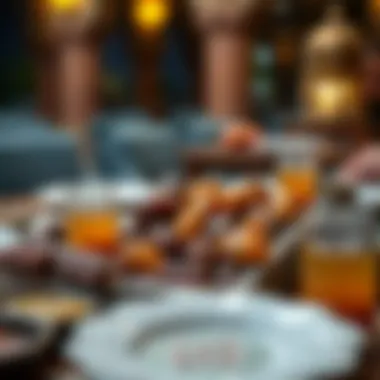
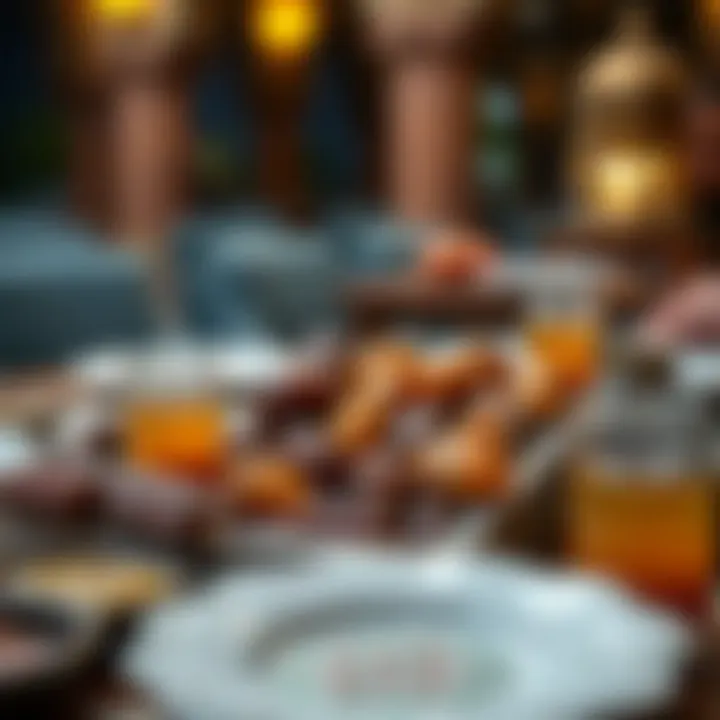
Knowing the iftar times is key for both locals and visitors. Praying, gathering with family, and enjoying a meal together aligns the community and reinforces familial bonds. For expatriates, understanding these times and their significance can bridge cultural gaps and foster integration into the local community. It’s about more than just eating; it’s about timing and togetherness.
Daily Iftar Schedule
Each day of Ramadan comes with a unique iftar schedule, reflecting the time for sunset based on geographical location within Dubai. This year, iftar time starts roughly between 6:45 PM and 7:00 PM, varying slightly from day to day. Here’s a breakdown of how the iftar schedule changes throughout Ramadan:
- Week 1: 7:00 PM
- Week 2: 6:55 PM
- Week 3: 6:50 PM
- Week 4: 6:45 PM
Of course, individuals should always check local resources or mosques for the precise timings since they may have their own announcement tied to their prayer schedules.
Variations Across Neighborhoods
In a city as diverse as Dubai, the variations in iftar times can also differ based on the neighborhoods due to local mosques setting the schedule according to their geographical latitude. For instance, areas closer to the sea might have a slightly earlier iftar than those inland.
- Downtown Dubai: Generally has one of the earliest iftar times, often attracting larger crowds to its public places.
- Deira: Reflects a mix of traditional and modern customs, making it a fascinating spot to observe communal iftars.
- Jumeirah: Offers many beachfront gatherings that provide a unique experience with stunning views.
Additionally, some areas may host community iftar gatherings that start a bit earlier to accommodate larger crowds, leading to an atmosphere filled with joy and togetherness. Keep an eye around, as these neighborhood celebrations often enhance the entire experience of Ramadan in this vibrant city.
Calculating Iftar Time
Understanding how to calculate Iftar time is crucial not just for fulfilling religious obligations, but also for planning and engaging in the community's rich tapestry during Ramadan. Timing this daily ritual precisely brings together family and friends and fosters a spirit of togetherness. This section delves into intricate methods of determining when to break the fast, highlighting both traditional and modern approaches.
Astrological Methods
For centuries, many have turned to astrology and astronomy to mark the advent of Iftar time. Traditionally, this method relies on observing celestial bodies. In Islam, the time for breaking the fast is signaled by the sunset, or when the sun dips beyond the horizon. This is a significant moment, as it represents not only the end of the day’s fast but also serves as a time for prayer and reflection.
To calculate the precise moment of sunset, one needs to consider the geographical location. For Dubai, local mosques often trap the fajr and maghrib call to prayer timings, which align closely with sunset times. The following steps might be helpful for newbies:
- Find local sunset times—these can easily be found by checking online or using Islamic apps designed for this purpose.
- Adjust the timing if your location has specific geographical nuances. Higher altitudes may experience sunset slightly differently compared to areas at sea level.
Understanding these astrological principles helps deepen one’s connection with the community and the essence of Ramadan, as well as observe the sun’s daily journey across the sky.
Technological Solutions
In today’s digital age, technology simplifies many facets of our lives, including calculating Iftar time. From mobile applications to websites, the options are virtually limitless.
For instance, various apps specifically designed for the Muslim community provide not just the time for Iftar but also allow users to adjust settings based on their location. Some popular apps like Muslim Pro or IslamicFinder have built-in algorithms to ensure that the Iftar schedule adjusts precisely, depending on the user’s city or even neighborhood within Dubai.
A few sources for reliable timing include:
- IslamicFinder: Offers precise prayer times and can be filtered by local times.
- Muslim Pro: A comprehensive app that not only tracks Iftar but also provides Quranic readings and community events.
However, while relying on technology is incredibly convenient, it’s essential to cross-reference with local mosques to ensure accuracy, just in case of any discrepancies. This dual approach—both traditional and contemporary—enriches the observance of Iftar, allowing everyone to partake in this beautiful moment with a full heart and a satisfied appetite.
The ritual of breaking the fast not only nourishes the body but also embodies a deeper spiritual connection, solidifying bonds of kinship and faith.
By acknowledging both astrological methods and technological solutions, one can ensure a more heartfelt and accurate observing of Iftar time, blending ancient practices with modern convenience.
Culinary Aspects of Iftar
The culinary elements of iftar serve not only as sustenance but as a vibrant cultural tapestry woven through the fabric of Ramadan. This mealtime, breaking the daily fast, extends beyond mere nourishment; it nurtures community bonds and perpetuates traditions passed down through generations. As the sun dips below the horizon, families and friends gather to partake in a feast that reflects diverse influences, offering a rich exploration of both traditional and contemporary dishes.
Traditional Dishes
Traditional iftar meals in Dubai echo the region’s historical roots, showcasing a delightful array of flavors and textures. Some customary dishes include:
- Dates: Often the first thing consumed, dates are laden with sugars and nutrients, providing an energy boost after a long day of fasting.
- Luqaimat: These sweet dumplings, drizzled with syrup or honey, are a popular treat that captures the essence of Emirati sweets.
- Samboosa: A beloved appetizer, samboosas come filled with spiced meat or vegetables, fried to golden perfection and best served hot.
- Mandi: A traditional rice dish prepared with chicken or lamb, flavored with a blend of spices and cooked with saffron, offering a hearty option for the iftar table.
Each dish carries stories and memories, symbolizing the communal spirit of the month. Sharing these meals brings together families on a daily basis, fostering a sense of unity and belonging.
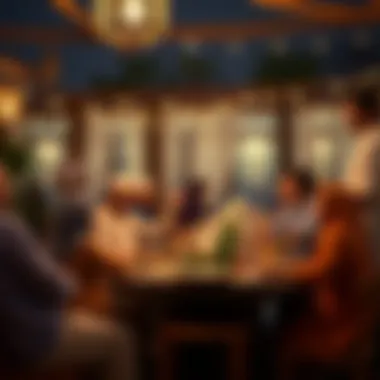
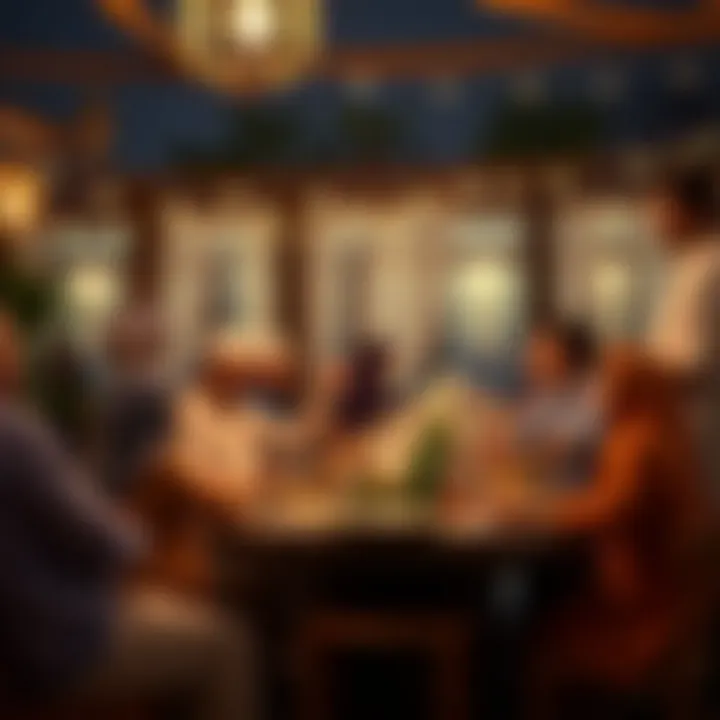
Modern Adaptations
In recent years, modern interpretations of classic iftar dishes have emerged, reflecting the cosmopolitan nature of Dubai and the culinary innovations that define contemporary dining. Many establishments are now offering:
- Vegan and Organic Options: As health consciousness rises, restaurants are crafting vegan and organic versions of traditional dishes, catering to diverse dietary preferences.
- Fusion Cuisine: The blending of flavors from various culinary traditions is on the rise. Imagine enjoying a sushi samboosa or a butter chicken shawarma, bridging cultural divides in a single bite.
- Artisanal Desserts: Local pastry chefs have begun to innovate, creating unique dessert offerings that incorporate both local ingredients and international techniques, such as baklava tarts or date-infused cupcakes.
With these adaptations, iftar meals become not only a reflection of the past but also a lens through which to appreciate evolving tastes and preferences. The shift highlights a growing appreciation for creativity in culinary traditions without sacrificing the essence of what makes these meals so significant.
"Food is not just about fulfilling hunger; it connects us to our roots while embracing modernity."
As the sun sets each evening during Ramadan, the iftar meal stands as a centerpiece of cultural significance blended with culinary artistry, making each gathering distinctive and memorable. Understanding these aspects can enhance not only the experience of the meal itself but also foster deeper connections to community and tradition.
Locals and expatriates alike find solace in the flavors that grace their tables, united by this shared experience purported to nourish not just the body, but also the spirit.
Public Iftar Events in Dubai
Public iftar events in Dubai serve as a remarkable testament to the spirit of community and sharing during the holy month of Ramadan. These gatherings offer residents and visitors alike a chance to come together for breaking their fast in a vibrant yet reverent atmosphere. The importance of these events cannot be overstated, as they embody the principles of unity and generosity that define this sacred time.
Community Gatherings
Community gatherings around iftar in Dubai are often organized in numerous locations, such as parks, mosques, and community centers. They not only provide a venue for breaking fast but also foster a sense of belonging among diverse groups. Attendees range from expatriates to locals, each bringing their unique flavor to the table. The joyous atmosphere encourages conversations and connections, making it a significant cultural experience.
During these gatherings, it is common to see long tables filled with traditional dishes, lovingly prepared by volunteers and local restaurants. Each bite of food shared signifies more than sustenance; it is emblematic of the bonds being formed and the stories being shared.
"In Dubai, iftar is not just about food; it’s about community spirit and cultural exchange."
In preparation for these events, local organizations and mosques often rally volunteers to help with logistics. People from all walks of life come together, contributing their time and effort to ensure a smooth and heartfelt evening. It encourages a feeling of camaraderie, allowing individuals to engage with one another in a relaxed setting, often including activities like music and cultural performances.
Charitable Initiatives
Moreover, many of these public iftar events incorporate charitable initiatives. It’s customary for a portion of the food served to support those who may need assistance, such as laborers and low-income families. Numerous organizations team up to provide meals to those unable to celebrate Ramadan with their families due to financial constraints.
The role of charity during Ramadan is profound, and this is often at the forefront of community iftar events. By providing meals for free, these initiatives promote the notion of giving back, aligning closely with the ethos of Ramadan.
Many initiatives encourage attendees to donate food, clothing, or funds, creating a cycle of generosity that establishes a strong support network within the city. This sense of social responsibility enhances the overall experience of iftar, transforming it into a celebration of not only personal reflection but also communal care.
In summary, public iftar events in Dubai represent a beautiful amalgamation of community, charity, and cultural richness. They allow for interaction among diverse populations and create opportunities for social investment, making each gathering a unique experience during the holy month. As residents and visitors converge around shared meals, they reinforce the values of compassion and fellowship, pivotal to the essence of Ramadan.
Dining Out During Iftar
Dining out during iftar is more than just breaking fast at a restaurant; it encapsulates tradition, community, and a sumptuous culinary experience that reflects Dubai's rich cultural tapestry. As the sun dips below the horizon and the call to prayer echoes, restaurants across the city transform into vibrant gatherings where families and friends come together. For many, this is a chance to relish both classic dishes and innovative cuisines, effectively illustrating the fusion of old and new that defines modern Dubai.
Top Restaurants
If you aim to make the most of iftar dining in Dubai, several establishments stand out due to their exceptional offerings and atmosphere:
- Al Hadheerah: Located in the Bab Al Shams Desert Resort, this restaurant offers a unique desert dining experience with traditional Arab cuisine. The ambiance here is awe-inspiring, with live entertainment including belly dancing and falconry displays.
- Zahr El Laymoun: A favorite among locals, it provides a Lebanese twist to iftar with a wide variety of mezze, grilled meats, and refreshing drinks. Its vibrant decor and the smells wafting from the kitchen create an inviting atmosphere.
- Eauzone: Nestled within the One&Only Royal Mirage, this beachfront restaurant presents a laid-back vibe alongside a menu brimming with delectable contemporary dishes, making it an ideal spot for a picturesque iftar.
- Ravi Restaurant: For those who crave authentic Pakistani flavors, Ravi is the place to be. Known for its delicious biryani and a range of curries, it is loved for its casual setting and affordability.
These restaurants are just a few examples of the myriad options available in Dubai, showcasing cuisines from around the globe while embracing the communal spirit of Ramadan.
Dining Etiquette
When dining out during iftar, understanding the local dining etiquette can enhance the experience significantly. The act of breaking fast is a cherished ritual, and adhering to certain customs fosters respect and harmony. Here are some key points to consider:
- Timing is Everything: The call to prayer signifies the end of fasting, marking the right moment to begin your meal. Many restaurants synchronize their services, starting once the sun has fully set.
- Sharing is Caring: Iftar meals are often designed for sharing. Portions are usually served family-style, encouraging diners to pass dishes around and sample a variety of flavors together.
- Respectful Behavior: It’s important to maintain an atmosphere of respect. While some diners might be focused on their meals, engaging in loud conversations might not be appropriate, particularly in more traditional settings.
- Dress Modestly: Though Dubai is diverse and cosmopolitan, dressing moderately—especially in public spaces—is encouraged during Ramadan. Opt for attire that reflects a level of respect for the occasion.
- Mind Your Manners: Be mindful of your table manners. Use your right hand for eating and avoid wasting food. This reflects a sense of gratitude, a value cherished during Ramadan.
By familiarizing oneself with dining customs and etiquette, visitors can enjoy a richer iftar experience, contributing to the overall spirit of Ramadan in Dubai.
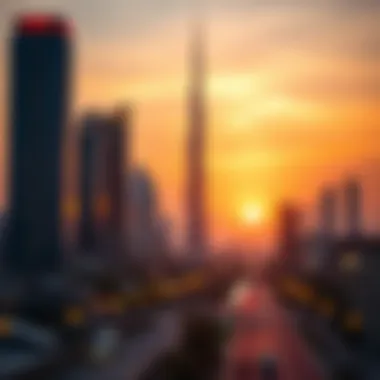
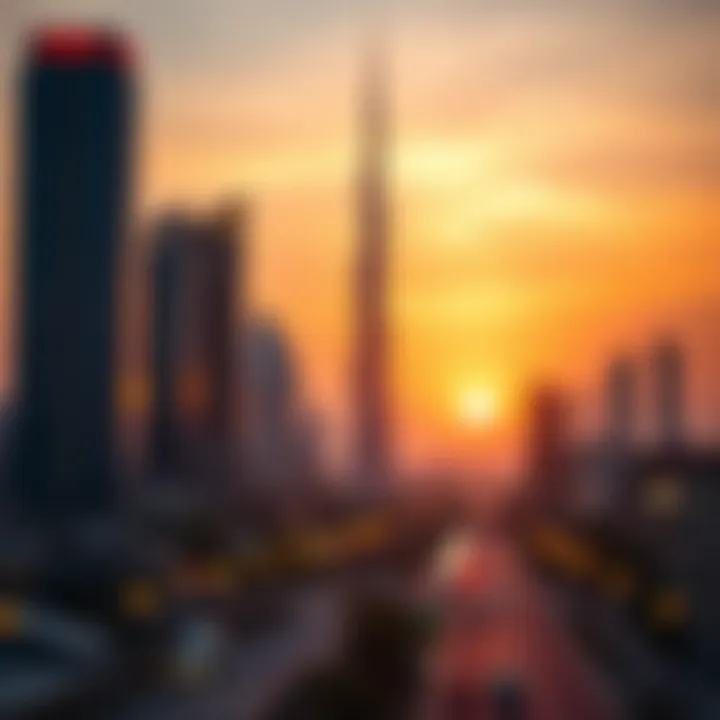
Remember, the essence of iftar in Dubai lies as much in the food as it does in the gatherings—each meal is a large dish of unity, respect, and shared joy.
Cultural Observances
The practices surrounding Iftar during Ramadan extend far beyond mere meal times. The act of breaking fast is deeply intertwined with local customs and serves as a reflection of the wider cultural tapestry of Dubai. This section explores the specific cultural observances associated with Iftar, which are indicative of both the heritage and the modern influences seen in the city.
Local Customs
In Dubai, Iftar is not just a personal endeavor; it's a communal celebration that signifies unity within the family and community. As the sun sets, numerous families gather around large tables laden with an extravagant array of dishes, often sharing food not just with family but also with friends and neighbors. The traditional way of breaking fast involves dates and water, following the Sunnah of the Prophet Muhammad. Beyond this, various Emirati dishes such as haris, a wheat and meat dish, and sharbat, a refreshing drink, make their appearance during this time.
Local customs also manifest in the vibrant community spirit. Mosques throughout the city often host public Iftar gatherings, where both residents and passersby can join in the meal. This is a chance for people of all nationalities and backgrounds to come together, highlighting not just the essence of Ramadan, but also the spirit of coexistence and inclusivity inherent in Dubai’s culture.
The emphasis on hospitality is paramount. It’s common for families to prepare extra portions of their Iftar meals specifically to share with their neighbors or those in need. This generosity forms the backbone of the community’s approach to Ramadan and reflects a deep-rooted understanding of social responsibility aligned with the teachings of Islam.
"Ramadan is a time for reflection, community, and giving back. The sharing of Iftar meals is an opportunity to strengthen bonds and support one another."
Respecting Differences
In a cosmopolitan environment like Dubai, it is vital to acknowledge the diversity of its residents. While Iftar is celebrated mainly in accordance with Islamic traditions, expatriates from various cultures have infused their unique flair into the observance. This mixing of customs substantially enriches the Iftar experience. For instance, Asian and Western residents might introduce their own culinary staples to the dinner, creating a fusion of flavors that reflect their own heritages while still respecting the essence of local practices.
Nevertheless, it is crucial for all individuals, particularly expatriates, to approach these observances with sensitivity. Understanding the importance of Ramadan to Muslim residents helps create an environment of respect and appreciation. This can be seen in the way many non-Muslims partake in Iftar events offered by local businesses or community centers, often educating themselves about the rituals and significance behind them.
In the broader context, awareness of local customs helps bridge the cultural gaps. It encourages expatriates to engage more meaningfully with their environment while ensuring that the rich traditions of Ramadan are preserved. Embracing the differences in celebrating Iftar not only exemplifies a spirit of unity but also highlights Dubai's unique identity as a melting pot of cultures.
Implications for Real Estate
The connection between cultural practices and real estate trends can often be overlooked. However, when we consider the role of Iftar during Ramadan, it's clear that this period has significant implications for the real estate market in Dubai. Iftar time brings communities together and fosters social interactions, which can influence property values and demand.
Market Trends
During Ramadan, the demand for specific types of properties can see distinct fluctuations. Many families and expatriates look to rent homes or apartments near public iftar events or communal dining places. This proximity not only enhances their experience during Ramadan but also allows for social engagement with neighbors.
Furthermore, when looking at market data, properties that are in areas hosting larger community events or public iftars typically see an uptick in rental prices as demand increases. Buyers perceive these areas as more desirable, attributing cultural significance to the location.
Here are some trends observed:
- Rise in short-term rentals: Many property owners choose to offer their homes for short-term lets during Ramadan, catering to those who are visiting relatives or engaging in community activities.
- Preference for family-friendly neighborhoods: Properties with easy access to parks and community spaces tend to attract more interest this time of year.
- Increase in commercial space demand: Restaurants and cafes that offer iftar specials often seek new locations, which can drive up commercial real estate prices in bustling areas.
Investment Opportunities
Ramadan presents a goldmine of investment opportunities for those in the real estate sector. Savvy investors recognize that properties located near popular iftar venues are likely to see sustained interest throughout the month. They consider both residential and commercial options, keeping an eye on the unique patterns that arise during this time.
Factors to consider include:
- Development of community-centric living spaces: Investing in properties that foster a sense of community, like mixed-use developments, can yield significant returns, especially during Ramadan.
- Cultural amenities: Properties offering proximity to mosques, places for communal prayer, and community centers often enhance their market appeal.
- Seasonal financing models: With an increased focus on community, financial institutions may offer tailored financing options that cater to renters and buyers alike during Ramadan.
In an ever-diversifying market, recognizing the influence of cultural events like Ramadan can provide invaluable insight for rental strategies and long-term investment plans. As investors and homebuyers gaze ahead, aligning property goals with community values could be the key to maximizing ROI in this unique landscape.
Finale
The significance of the iftar meal during Ramadan in Dubai transcends mere sustenance. It engenders a profound sense of community, reflection, and cultural identity. In a city known for its rapid development and multiculturalism, the iftar tradition weaves through the fabric of everyday life, offering a moment of pause and gratitude amid the bustling environment. As residents and visitors come together to break their fast, they partake not only in a religious observance but also in an enriching cultural experience that fosters social bonds.
Reflection on Iftar's Role
Iftar serves as a beacon of hope and unity. It's a time when families gather, friends reconnect, and communities open their doors to one another. The transition from the fast to the meal is often marked with personal rituals, be it a date or a sip of water, and these acts, however simple, possess deep meaning and significance. In Dubai, these rituals are complemented by the city’s diverse culinary offerings, where eateries showcase both traditional and modern dishes. This blend of the old and new reflects Dubai’s dynamic nature, allowing for innovation while honoring longstanding customs.
The role of iftar extends into social responsibilities. Many establishments offer meals for free or at reduced rates to those who may struggle to afford them. This gesture not only embodies the spirit of generosity inherent in Ramadan but also strengthens community ties. Far from being just a necessity, iftar embodies the ethos of sharing, kindness, and togetherness.
Future Outlook
Looking ahead, it's essential to recognize that the observance of iftar in Dubai might evolve in response to global trends and challenges. As the city continues to attract expatriates and tourists, new layers of cultural influence may emerge, enriching the traditional iftar experience. Restaurants may increasingly innovate with fusion cuisines, inviting a mix of global flavors while retaining core elements of local dishes.
Moreover, the rise of technology could impact how people engage with Ramadan traditions. With the increasing reliance on apps to calculate iftar times and restaurants promoting their offerings via social media platforms, convenience is likely to play a larger role in shaping the future of iftar dining in this vibrant city.
As the culture adapts, the essence of iftar—the gathering, the feasting, the celebration of faith—will likely remain steadfast. In this regard, stakeholders from various sectors, including real estate agents and developers, would do well to understand these shifts. They should consider how these cultural traditions can enhance community living and create vibrant spaces for gathering, which ultimately capitalizes on the growing interconnections within the city’s fabric.











